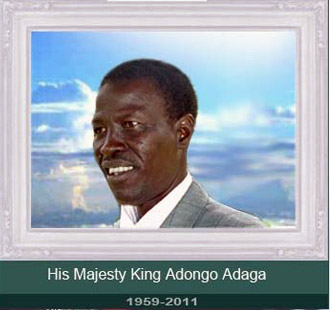Anyuak to crown new King next week in Pochalla, Jonglei
April 16, 2012 (JUBA) – The Anyuak ethnic group have announced that their new King, Akwai Agada Akwai Cham, will be inaugurated on 25 April in the tribe’s traditional palace in Otllo village in Pochalla County of South Sudan’s Jonglei State.

Bulla, who is also the chairman of Land Infrastructure Committee in Jonglei State’s parliament, told the press that invitations had been sent to levels of the South Sudanese government this week. He also noted that Shilluk King from Upper Nile State is expected to attend.
Akwai Agada Akwai Cham will be the 24th head of the Anyuak Kingdom. He replaces his brother, King Adongo Agada Akwai Cham, who died in November 2011 in Nairobi.
King Adongo is remembered by the Anyuak community for the development packages he brought to the Anyuak Kingdom before his death.
The new King will play an important role in bringing development to Anuyak areas as well as resolving border issues with neighbouring groups, Bulla said.
Pochalla County is situated in eastern Jonglei State, borders Ethiopia where some Anuyak also live. The area has been relatively unaffected by recent conflict and cattle raids between ethnic groups in South Sudan’s largest state, according to Bulla.
Anyuak means “people sharing ideas”, he said, adding that they are a “peaceful community”.
Bulla said that the Anyuak traced their roots to Bahr-el-Ghazal in South Sudan’s west, adding that they were also related the Jur-Chol as well as the Shilluk and Gilo of Upper Nile State.
The Anyuak people also refer to themselves as Anywaa or Agnwak, while their neighbours; particularly the Dinka, Nuer and Shilluk, simply know them as Anyuak.
The Anywaa-land originally stretched from the Sobat River and its tributaries into the western Gambella region Ethiopia and down to Akobo and Pibor counties in the south of Jonglei.
Much of this land was lost to due to Nuer migration in the 19th – 20th centuries; and what used to be Anywaa settlements in placed like Abwong, Adong and Akobo are now predominantly Nuer or Dinka areas after the dispersal or assimilation of the Anywaa inhabitants.
The Anywaa now live in Pochalla, South Sudan and Gambella, Ethiopia.
The Anyuak speak dho-Anywaa, almost a 100% understandable to the dhi-Pari, and very close to dhok-Chollo (Shilluk language) and dho-Luo of Bahr el Ghazal.
The communities have different cultural practices that are demonstrate through various forms such as the arts, music, culture, fashion, literature and sport.
(ST)
